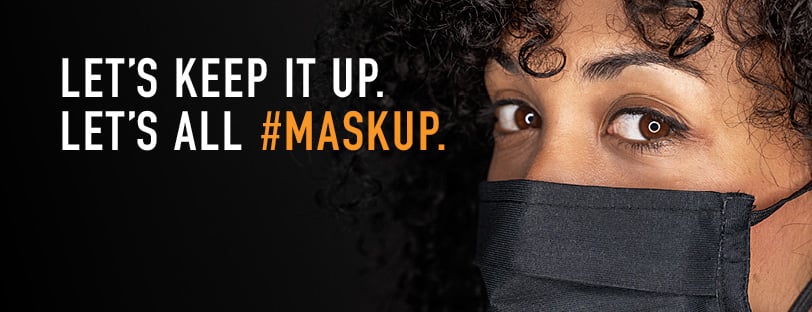Why it's important to #MaskUp even after getting the vaccine
This post was originally shared on AllWays Health Partners' provider blog, Best Practice.
AllWays Health Partners is proud to join Mass General Brigham and other health care systems across the country to encourage people to slow the spread of COVID-19 with the #MaskUp initiative.
The science is clear: masks are our best chance of preventing people from spreading and getting COVID-19. More than 11.5 million Americans have tested positive for the virus – including an additional one million in just the past week – leading to nearly 250,000 deaths. Although cases are rising, the good news is that a rapid vaccine rollout is underway. However, the vaccine does not prevent people who have been vaccinated from infecting others with the virus.
Reminder: Both the Moderna and Pfizer vaccines use messenger RNA (mRNA) technology to build your body's defense against the virus. This helps your body generate an antibody response and retain the information in memory immune cells. This way, a vaccinated individual can attack the virus if they are exposed.
However, as noted by the New York Times, "…the Pfizer and Moderna trials tracked only how many vaccinated people became sick with COVID-19. That leaves open the possibility that some vaccinated people get infected without developing symptoms, and could then silently transmit the virus — especially if they come in close contact with others or stop wearing masks. If vaccinated people are silent spreaders of the virus, they may keep it circulating in their communities, putting unvaccinated people at risk."
Mask must-haves
The CDC recommends wearing a mask that:
- Has two or more layers of washable, breathable fabric
- Completely covers your nose and mouth
- Fits snugly against the sides of your face and don't have gaps
"We are not defenseless against COVID-19," said CDC Director Dr. Robert R. Redfield. "Cloth face coverings are one of the most powerful weapons we have to slow and stop the spread of the virus – particularly when used universally within a community setting. All Americans have a responsibility to protect themselves, their families, and their communities."
The CDC and healthcare professionals nationwide can all agree that these next few months are critical. Everyone must do their part to slow the spread, reduce the number of hospitalizations, and protect both essential workers and the most vulnerable population.
The call to #MaskUp will continue to run in The New York Times, USA Today, The Wall Street Journal, The Washington Post and The Los Angeles Times. Additionally, hospitals and health systems across the country will continue to unite to share these messages regionally.
The message of #MaskUp
"As the top nationally-ranked hospitals, we know it's tough that we all need to do our part and keep wearing masks. But, here's what we also know: The science has not changed. Masks slow the spread of COVID-19. So, please join us as we all embrace this simple ask: Wear. Care. Share with #MaskUp. Together, wearing is caring. And together, we are saving lives."
In addition to masking, the CDC suggests that everyone minimize the number of non-household contacts, maintain a physical distance of at least six feet, and limit the amount of time around others, especially while indoors and in poorly ventilated areas.
For further information about masking guidelines – how to choose a mask, how to properly wear a mask – visit the CDC website.
Protect yourself and protect others; #MaskUp
About this initiative
Everymaskup.com is a collaboration of 100 leading health systems representing thousands of hospitals across the U.S. joining together to create messages for the betterment of communities they serve. The impetus for this, and other public service campaigns to follow, came from a group of health care marketing and communications executives meeting for a decade and reengaged weekly since the COVID-19 pandemic began. The goal is to share knowledge and experience, best practices, strategies and resources- knowing they can accomplish more together.
Founded and led by Rhoda Weiss, Ph.D., Los Angeles-based national health care leader and consultant, the expanded coalition is partnering with Cleveland Clinic Chief Marketing and Communications Officer Paul Matsen and his team for this effort. Additionally, hospitals and health systems on a regional basis continue to come together to send messages like these of prevention and safety, hope and healing, life and death, care and caring.
